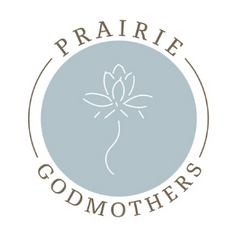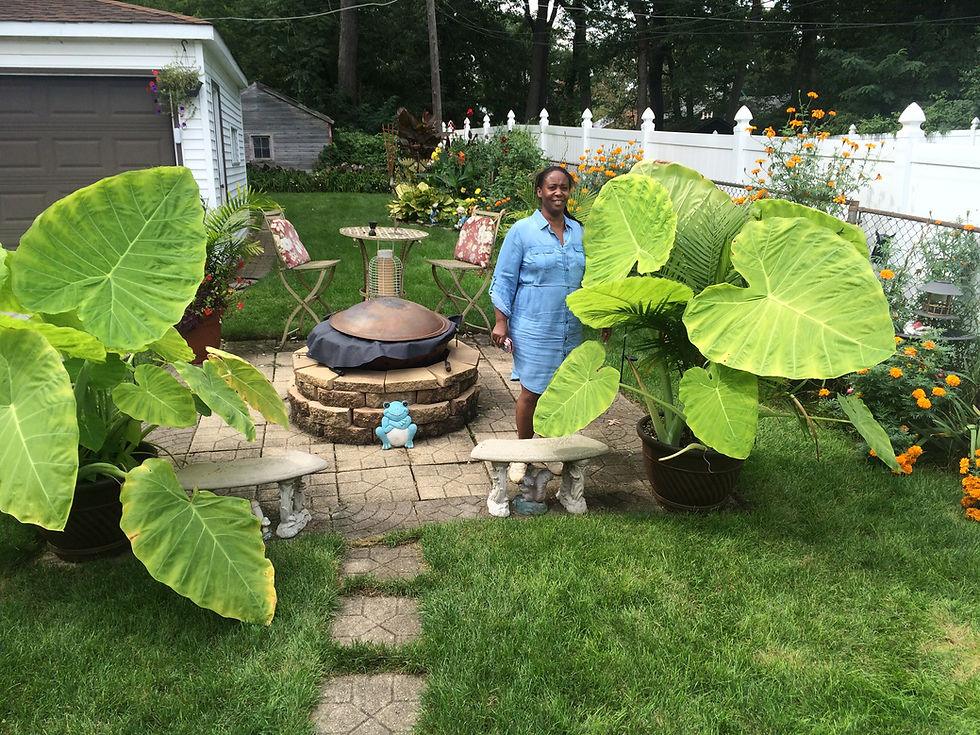20 Plants for Chicago Bungalow Gardens
- Angela Pauldine, Director of Communications

- Apr 28, 2020
- 7 min read
Updated: Oct 12, 2022
To show appreciation for the 20,000+ dedicated homeowners who have joined as members of CBA in 20 years, we are posting one blog each month in 2020 listing 20 things of interest to bungalow and vintage home owners. #Bungalow2020!

Gardening season is upon us! Whether you're in the planting, planning, or daydreaming phase, we wanted to provide some ideas and advice on what to grow.
We asked four local garden experts who have experience designing landscapes for Chicago bungalows: What are the best plants for Chicago bungalow gardens?
For flowers, here's what experts from City Grange, Taylor Made Landscape Design, and Prairie Godmothers, recommend:

1. False Indigo
(Full or Partial Sun)
Bridget Walsh, who holds the title of "Our Lady of Landscaping" at City Grange, loves this plant for a few reasons: "This 3-to-4-foot perennial gives great structure to the back of a bed. It takes full to part sun and can grow well in clay soils! Tiny little sweet pea-like indigo flowers bloom in June, but its soft blue foliage and seed pods also provide great texture and interest. Did I mention it’s a native?"

2. Prairie Smoke
(Sun or Partial Shade)
"Geum is a team favorite," Walsh told us. "It’s a perfect native perennial for small spaces, coming in at about 10 to 12 inches tall and wide. It blooms in early spring with magnificent wispy seed heads and bright pink, fuzzy stems. These bring serious texture and fun ornamentation to your plant palette. There are several hybrid varieties of geum too, all with bright colors and interesting stems."

3. 'Hot Lips' Turtlehead
(Partial Sun)
"I don’t see Chelone enough!" Walsh said. "It has quite a presence in the garden, about 3 feet tall and wide, with dense foliage that turns to a beautiful bronze in autumn. Its bright pink snapdragon-like flowers show off in late summer, August to October." These plants are "great in a moist, part-sun butterfly garden, but can tolerate light shade, too." Also worth trying is Chelone glabra, a native white flowering variety available at City Grange.

4. Hellebore
(Partial Shade)
Walsh also recommends Hellebore, and said, "This is an all-in-one sort of perennial, and I use them anytime I get the chance. Shade tolerant, evergreen foliage, and long-blooming unique colors, all-in one?! Yup." According to Walsh, Hellebore is a reliable, interesting plant that is "a work horse in a small garden." Her favorite pairing is Hellebore planted near Brunerra and fern "for a trifecta of shady textural goodness."

5. Climbing Roses
(Sun or Partial Shade)
Maureen Taylor, owner of Taylor Made Landscape Design, said, "If you have a fence, trellis or arbor, consider planting at least one of these beautiful flowering vines. They come in all colors from white to nearly black. Some of them are fragrant and newer varieties are often repeat bloomers." Most roses perform best in full sun, but Taylor suggests trying the Zephirine Drouhin, which "can take a bit of shade, is dark pink, nearly thornless, and is very vigorous at nearly 14 feet."

6. Hollyhock
(Full Sun)
Another flower Taylor loves for bungalows is Hollyhock. "For a tall, colorful, back-of-the-border plant, you can’t beat old fashioned Hollyhocks," she said. "They can get to be 6 to 8 feet tall and will re-seed freely. These are very low maintenance plants."

7. Coneflower
(Full Sun)
Jackie Riffice, former owner of Prairie Godmothers, recommends this classic native flower. "Native coneflowers have droopy petals," she explained, "while hybrid coneflowers, or non-natives, have petals that stand at attention. Both are beloved by bees and butterflies—and goldfinches sneak in there after the petals have fallen. They love direct sunlight, bloom all summer, and depending on the variety, grow from 1 to 2 feet tall and 1 foot wide."

8. Hyssop
(Sun or Partial Shade)
"This anise-smelling plant has leaves that are used to flavor teas and jellies," Riffice told us, "We love to brush up against this beauty as it gets the whole garden smelling so, so sweet and attracts all those beneficial bugs. Hyssop is available in both native and hybrid varieties, thrives in sun to part shade, blooms summer and fall, and grows to 2 feet tall and 1 foot wide."

9. Camassia Quamash
(Sun or Partial Shade)
"Camassia is a Prairie Godmothers super-favorite," Riffice said. She explained, "As a root vegetable, Native Americans roasted the bulbs until they were sweet and sugary. We like to plant quamash in every garden we tend because of the vibrant blue and white blooms—they are show stoppers." Quamash likes sun to part shade, grows about 2 feet tall and 1 foot wide, and blooms in the spring, "so bulbs need to be planted in the fall," Riffice said. There is a native version of this plant, although Riffice told us a hybrid tends to be much easier to find.

10. Lesser Calamint
(Sun or Partial Shade)
"This perennial plant is a member of the mint family," Taylor explained, "It gets to be about 18 to 24 inches tall and wide and looks a bit like Baby’s Breath." She suggests using it as the middle or front of a perennial border in your garden. "It’s very long blooming and very attractive to bees and butterflies," she added.
For shrubs, here's what experts from Taylor Made Landscape Design, Prairie Godmothers, and Craeft suggest:

11. Bridal Wreath Spirea
(Sun or Partial Shade)
"Everyone’s grandmother had one of these in her yard," Taylor said. If left to its own devices, this large shrub can reach 8 feet tall and wide, according to Taylor. "The size can be controlled a bit by very careful pruning so as not to ruin its natural arching habit." If you don’t have the space for the full sized shrub, she suggests planting a smaller version of spirea that grows to just 2 to 3 feet wide and tall, called Spiraea betulifolia ‘Tor.’ "It’s a neat and tidy shrub," she said, "and looks great even when not in flower. Plus, it has great fall color."

12. Arrowwood
(Sun or Partial Shade)
To Taylor, "fragrant viburnums are a must have in any garden." Both Carlesii and Judii viburnum add structure to a garden, "and they have the ability to add wonderful spicy fragrance to your space." She recommends planting one near your front or back door "so that you can enjoy their sweet fragrance when entering or exiting your house." The full size varieties grow to around 6 to 7 feet high and wide, but there are dwarf varieties available too. Viburnums have good fall color, and another plus she told us is that "these are resistant to the Viburnum Beetle."

13. Ninebark
(Sun or Shade)
Ninebark "would make a perfect specimen shrub under a bungalow window or next to the front entry," Riffice suggested. "This guy has beautiful leaf color, a cinnamon inner bark, and blooms pink in June. It grows in sun and shade, and if left unpruned, will get about 8 feet tall. We keep ours trimmed to about 5 feet, pruning in the late fall before the buds are set for the next spring." Native and hybrid varieties are available, she said, "so plant a native if you can, but you won’t go wrong with a non-native."

14. Smooth Hydrangea
(Sun or Partial Shade)
"The world of hydrangeas is large," Riffice explained, "but we recommend a smooth hydrangea for your garden." Specifically, she recommends a variety called "Annabelle." She suggests planting them in groups of three or more to form "a loose hedge with eye-popping white flower heads that are striking all summer. When they dry out, they remain as interesting and striking in the fall." Smooth hydrangeas like sun or shade, bloom in summer, and grow 3 feet tall by 2 feet wide."

15. Smoke Bush
(Full or Partial Sun)
Jeffrey Kosmeder, owner of Craeft (and CBA Driehaus Award winner) loves this shrub for its beautiful seasonal colors. "Smoke bush is often used as a garden specimen, very much like a Japanese Maple," he told us.

16. Mugo Pine
(Sun or Partial Shade)
If you love evergreens, Kosmeder recommends Mugo Pine for your garden's ground cover. "A mugo pine is a popular cultivar that is a true dwarf," he explained. It can be used in your garden to offer a "great transition of height and texture from ground covers to taller shrubs and plantings." According to Kosmeder, its "virtually maintenance-free… not a fussy plant."
For ground cover, here's what experts from Craeft and City Grange suggest:

17. Creeping Lilyturf
(Sun or Partial Shade)
Kosmeder recommends this flowering perennial as a "great ground cover that looks like ornamental grass." Creeping lilyturf is a tough plant, "but can overwhelm a garden if not contained by edging," he warns.

18. Japanese Pachysandra
(Shade)
To Kosemeder, this is a "go-to ground cover that will quickly create a yearlong sea of green. Zero maintenance, iron plant… beats using mulch any day!"

19. Blue Rug Juniper
(Sun or Partial Shade)
Kosmeder recommends this ground cover "for those who like blue-greens in their garden." It's a low-growing, extra wide spreading evergreen. According to Kosmeder, Blue Rug Juniper is also salt tolerant.

20. False Forget-Me-Not
(Shade)
Finally, this ground cover is a suggestion from Walsh. "This plant brings me immense joy," she told us. "Tiny sky blue flowers float above iridescent, heart-shaped leaves. I love Brunnera with early yellow spring bulbs and interplanted with low growing ground covers for strong contrast. It stays nice and compact, at about 12 to 16 inches wide and tall. Because of its silvery foliage, it really pops in a shade garden."
How can the experts help?
Bridget Walsh, City Grange
Bridget Walsh is a landscape designer at City Grange, a social enterprise garden center that offers a full suite of garden products and services. During the current shelter-in-place, check out City Grange's free online classes and plant delivery. Also, take a look at the custom landscape design plans Bridget made for our members! For questions, email Bridget Walsh at bridget@citygrange.com
Jeffrey Kosmeder, Craeft LLC
Jeffrey Kosmeder is a master craftsman and owner of Craeft LLC, with a background in architecture and a Driehaus Foundation Bungalow Award under his belt. Craeft offers custom carpentry works, including bungalow window boxes, and new in Spring 2020, is offering a full suite of garden services, including: landscape design, plant delivery and installation. For questions, email Jeffrey Kosmeder at contact@craeft.net
Maureen Taylor, Taylor Made Landscape Design
Maureen Taylor, Master Gardener and owner of Taylor Made Landscape Design, offers landscape design services. During the current shelter-in-place, they are still meeting new clients outdoors and respecting social distancing requirements. For questions, email Maureen Taylor at info@taylormld.com
Jackie Riffice, Prairie Godmothers
Although Prairie Godmothers put their garden services to bed about 5 years ago, former owner Jackie Riffice is happy to offer guidance to members of the Chicago Bungalow Association, free of charge. She is well-versed in what works in Chicago bungalow landscapes and urban gardens, and you can email her with even the simplest garden question at Jackie.Riffice@Zep.com












This was great to read, thank you.
Thank you for the gardening information. A shout-out to the gardening stores who are open or will soon be opened - thank you, too!! I am inspired by the tips, and today's gorgeous weather, and am heading out to our front & back yards. BY the way, I am wondering whether CBA is collecting photos of spring gardens (like the summer garden event, without the prizes :-))?